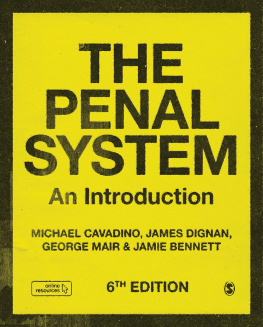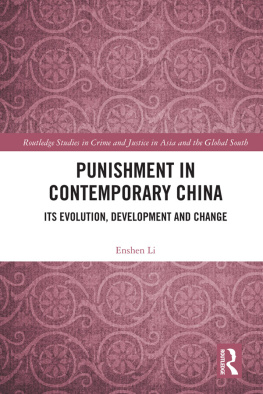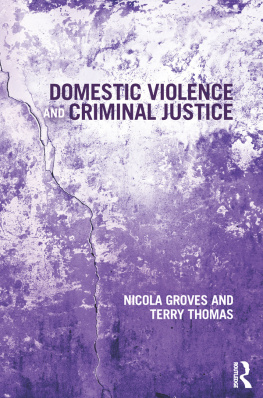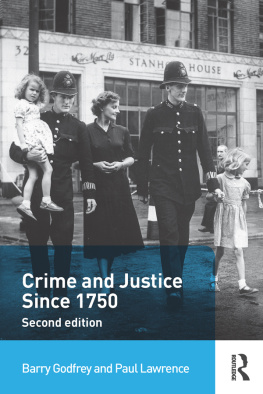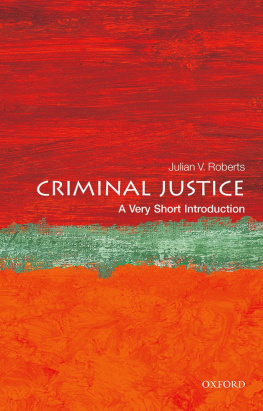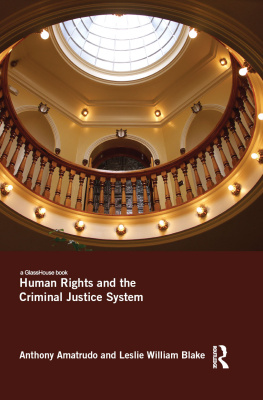SAGE Publications Ltd
1 Olivers Yard
55 City Road
London EC1Y 1SP
SAGE Publications Inc.
2455 Teller Road
Thousand Oaks, California 91320
SAGE Publications India Pvt Ltd
B 1/I 1 Mohan Cooperative Industrial Area
Mathura Road
New Delhi 110 044
SAGE Publications Asia-Pacific Pte Ltd
3 Church Street
#10-04 Samsung Hub
Singapore 049483
Michael Cavadino, James Dignan, George Mair, Jamie Bennett, 2020
First published 1992
Second edition 1996
Third edition 2001
Fourth edition 2007
Fifth edition 2013
This sixth edition published 2020
Apart from any fair dealing for the purposes of research or private study, or criticism or review, as permitted under the Copyright, Designs and Patents Act, 1988, this publication may be reproduced, stored or transmitted in any form, or by any means, only with the prior permission in writing of the publishers, or in the case of reprographic reproduction, in accordance with the terms of licences issued by the Copyright Licensing Agency. Enquiries concerning reproduction outside those terms should be sent to the publishers.
Library of Congress Control Number: 2019943592
British Library Cataloguing in Publication data
A catalogue record for this book is available from the British Library
ISBN 978-1-5264-6068-4
ISBN 978-1-5264-6069-1 (pbk)
Editor: John Nightingale
Editorial assistant: Eve Williams
Production editor: Sarah Cooke
Marketing manager: George Kimble
Cover design: Francis Kenney
Typeset by: C&M Digitals (P) Ltd, Chennai, India
Printed in the UK
At SAGE we take sustainability seriously. Most of our products are printed in the UK using FSC papers and boards. When we print overseas we ensure sustainable papers are used as measured by the PREPS grading system. We undertake an annual audit to monitor our sustainability.
Preface to the Sixth Edition
George Mair
Jamie Bennett
The Penal System was first published in 1992 and now, in 2019, here comes the sixth edition. The longevity of the book is we hope an acknowledgement of the coherence and persuasiveness of its arguments. It is also, of course, a result of the penal crisis that it explores being with us for so long that the book still has contemporary relevance. And, last but by no means least, it is a tribute to the work of Mick Cavadino and Jim Dignan who recognized the need for a book focusing on the problems associated with the penal system and unlike many academics then went on to write that book. Retirement has meant that Mick and Jims input to this edition has been limited, but we hope that this edition lives up to the standards that they have set.
This edition brings the narrative up to the beginning of 2019 and the crisis continues. Indeed, the last six years have if anything seen matters worsen. Chris Grayling, one of several Justice Secretaries during this period, seemed bent on ruining both prisons and probation. Austerity has meant deep cuts in prison, court and probation budgets with serious, wide-ranging and negative consequences. The probation service has been subjected to a disastrous privatization initiative which has led to near-total collapse. And the ongoing confusion and uncertainty around Brexit have led to an increasing sense of instability across the political board which shows little sign of resolution. As we argue, this sense of impending crisis may just provide an opportunity for reform of the penal system, but we are not holding our breath.
It would be invidious to single out those individuals who have helped us directly and indirectly with this edition; we are grateful to you all you know who you are. As usual, Sage has been supportive throughout. Finally, we wish to acknowledge our partners and children who have to live with the writing process not always an easy thing to do. George would like to thank Carmel for her unfailing patience and love; and Ruth and Ethan for being themselves. Jamie would like to thank Susan, Ben and Elizah, who make every day worthwhile.
Online Resources
The Penal System: An Introduction (Sixth Edition) is accompanied by a full Online Resources site, which you can access at:
https://study.sagepub.com/thepenalsystem6e
Containing resources for both lecturers and students, the website complements and builds on the material presented in the book, and includes the following:
For Instructors
The Sample Syllabus helps instructors devise a course plan according to the books content to improve both teaching and learning experiences.
PowerPoint Lectures can be utilised as guidelines for course presentations and adapted as needed for the modules necessities.
For Students
A carefully curated list of Web links including blogs, datasets, and webpages provides students with the most relevant research material.
Annotated further reading for each chapter directly complements the subject matter for every chapter and supports further study.
Updated summaries of key legislation, White Papers, consultation documents and other official reports.
Chapter Contents
) is of relevance to more than one country; and at times we will be referring to other penal systems to help illuminate the English (and Welsh) experience. While we have tried to be factually correct, to outline differing viewpoints and to be as comprehensive as is possible in a book of this size, we have not felt any need to be shy about expressing our own opinions. In a nutshell, these are that the English penal system is unjustly and irrationally harsh, and that our penal practices and attitudes towards punishment require radical revision.
I.1 The Criminal Justice System
The penal system, which exists to punish those found guilty of crimes, is part of a larger entity known as the we deal with the criminal justice system as a whole.
There now follows a very brief and basic guide to the criminal justice system as a whole, to assist readers who may not be familiar with the system or its terminology..
In many cases when a crime is committed indeed, in most cases the agencies of criminal justice never respond at all. For the criminal justice process normally starts to operate only when a crime is reported to the police, and fewer than half of all crimes are reported. For the year ending March 2018, it was estimated that only around 40 per cent of all crimes uncovered by the Crime Survey for England and Wales were reported to the police (ONS, 2018). And the police fail to officially record about 29 per cent of those crimes that are reported (ONS, 2018). If an alleged offence is reported, or otherwise comes to the attention of the police, the police may then investigate it. The police have a wide range of powers (notably those contained in the Police and Criminal Evidence Act 1984) to carry out searches and to arrest and question suspects in pursuit of their investigations. If there appears to be sufficient evidence to put a suspect on trial, the police may an arrested suspect with the offence. This is the first stage in the prosecution process, and it is now the Crown Prosecution Service (CPS) a state agency independent of the police who instruct the police as to whether suspects should be charged in most cases of any seriousness. The police then normally take the suspect before the local magistrates court, where the prosecution is conducted by the CPS.

